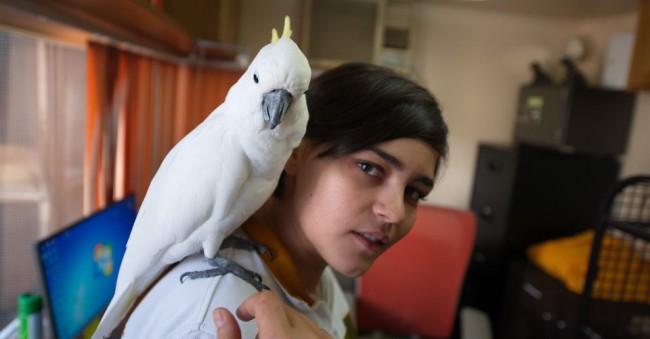and Dubai International Airport
and Dubai International Airport

Did you forget her birthday? Your anniversary of the day you brought her home? Why has your beautiful (and affectionate) bird suddenly fallen out of love with you? Not to worry (well, no, you should worry a little, perhaps), yours is not an isolated incident. Quite often pet birds from the Parrot family are so sensitive to change around them that they seem to undergo a radical shift in personality, becoming "mean", and generally responding to their owner in a hostile way. Not fun.
Don't Take It Personally
Well, it's a bit of a challenge not to take Polly's sudden cold shoulder (or feathery wing) personally. But what we mean is, yes, take it personally, but only in order to find a solution, rather than do anything dramatic like hating yourself, ignoring your bird or (heaven forbid!) giving her away. Some parrot wisdom (which relates to any animal really) is that parrot logic is different from human logic; don't judge Polly's behaviour in terms of "love" or "hate". We tend to (word of the day ahead) anthropomorphise animals, wrongly ascribing to them human characteristics. Yet what your parrot probably needs is to re-bond with you again, rather than couples counselling. :-)
Why Polly? Why?
First and foremost, be clear that Polly's new (hopefully temporary) personality is very possibly, perhaps even probably, not related to her being physically unwell. If you suspect she's not feeling fine, then a trip to the vet for a check-up is advisable, of course. However, if it turns out to be definitely just(!) a radical mood swing in the wrong direction, and having no connection to a medical issue, then the first thing to ask yourself is: What's changed?
You see, in addition to being pretty darn clever, and perhaps because of this, parrots are very sensitive to changes in their environment. In fact, their vision alone is worthy of super-hero status. They have four cones for colour vision, while we only have three, meaning that they see colour with more intensity, as well as being able to see ultraviolet light. Pretty nifty, eh? The drawback to being so sensitive is they pick-up if we're stressed. Hells-bells, they actually pick up if we've grown a moustache, shaved off the beard, had our hair colour changed, got new glasses, or even if we've had a pacemaker put in. There's no pulling the wool over Polly's eyes... or much of anything else either. ;-)
So ff you or the environment around Polly has changed, this may mean that she thinks of you as a stranger again, explaining the hostile behaviour. It does sound a bit like that old love song, "Now the trust has gone...", but you can win her "love" and trust back again, believe it or not. (Oh, and think about getting rid of the moustache! )
Mending the Bond
The bonding "sessions" may need to start from scratch, much like you did (you did, didn't you?) when you first got your parrot. This "back-to-basics" is great therapy for you too as you need to check your own energy levels first. Gauge how stressed, depressed, angry (what you? never!) or emotional you are before interacting with your parrot. The more reactive you are to her, the more the cycle of alienation or hostility will grow, so be sure that you're in a "good space" before approaching your bird.
While parrots can't actually be forced to love you (again), they can be convinced that you are the wonderful-special-Polly-adoring-human that you are. But with time, effort and patience. The rewards of being in Polly's flock are immense, as any bird lover will tell you (and you don't actually have to remember their birthday).
Office Coordinators -cum- Receptionists
Animal Relocations Officers

